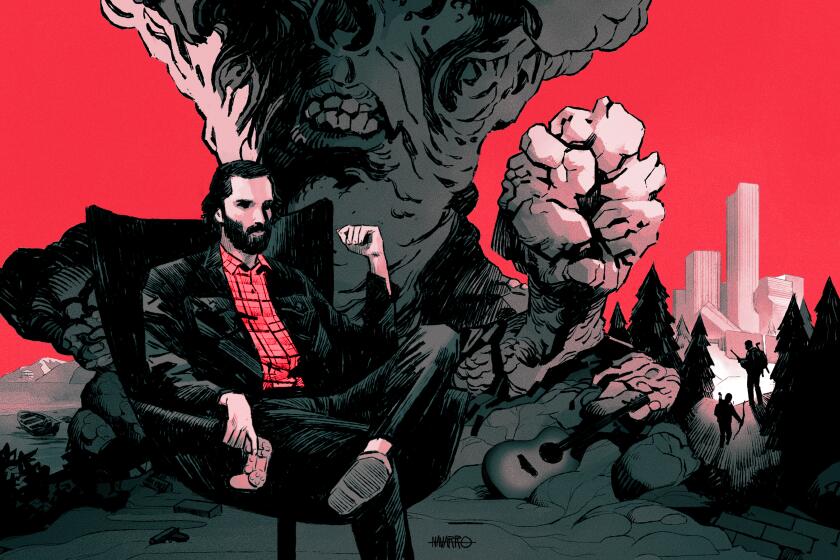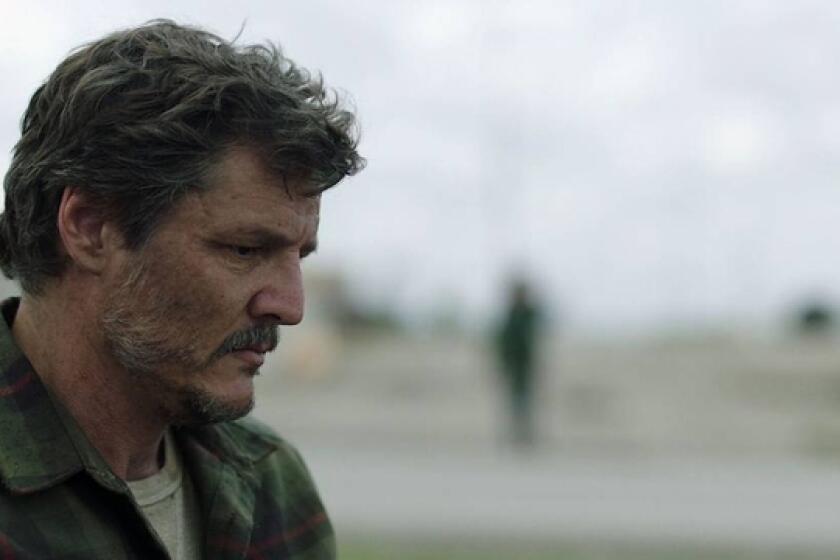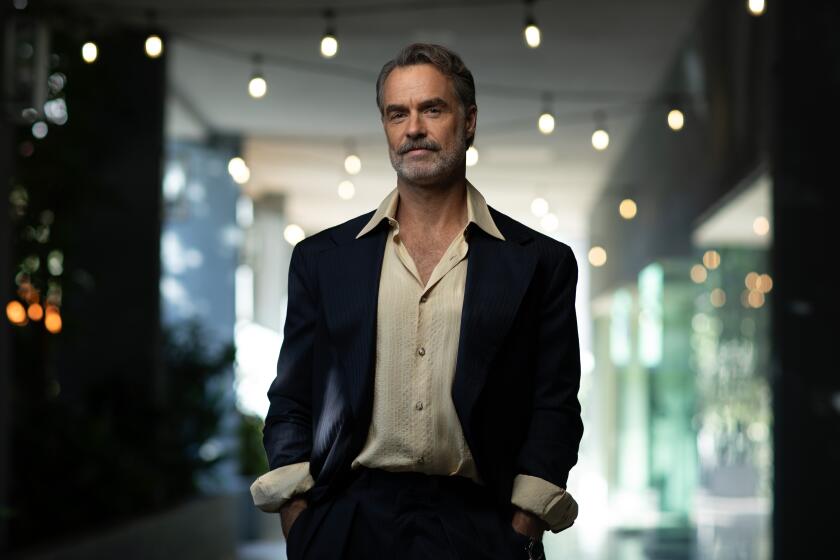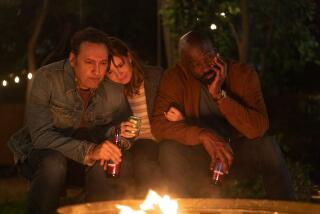‘The Last of Us’ team explains the ‘skeleton key’ episode that has everybody talking
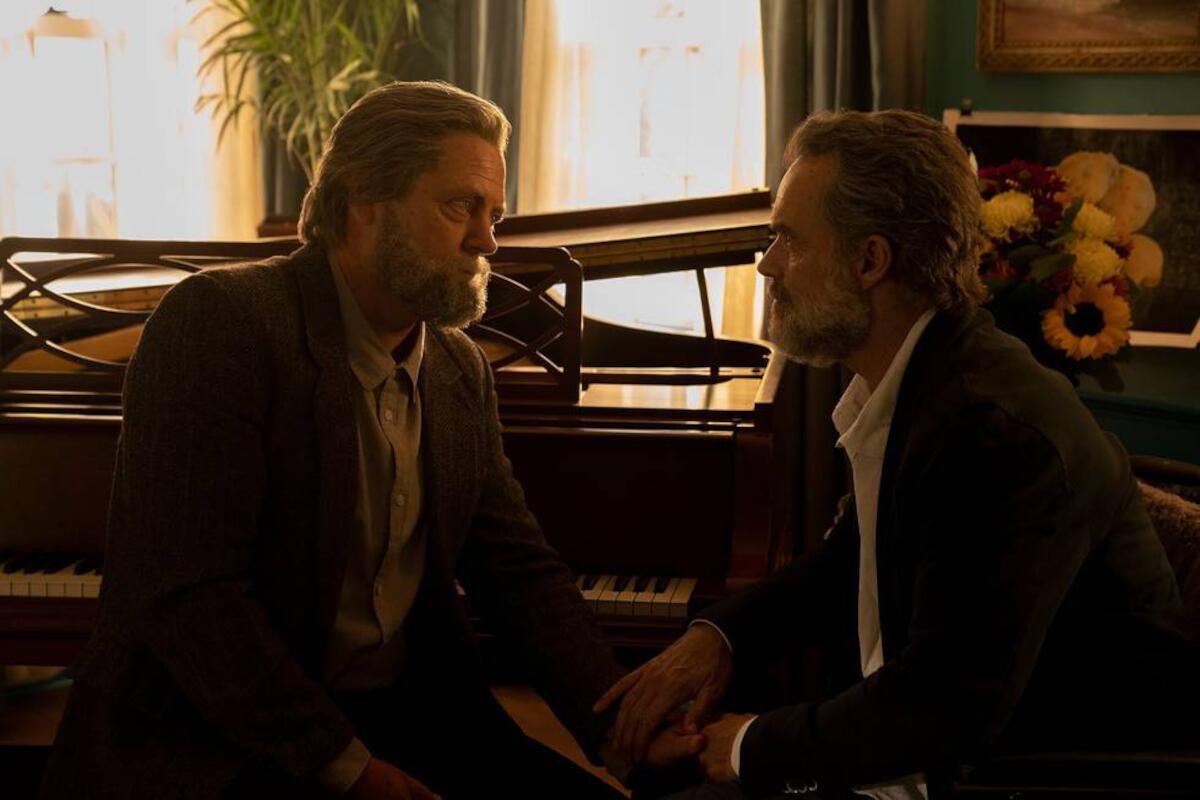
- Share via
This story contains spoilers for Episode 3 of HBO’s “The Last of Us” and corresponding moments from the 2013 videogame.
The third episode of “The Last of Us” takes viewers back to the beginning of the world’s fungal apocalypse.
Sunday’s installment, the most intimate of the series so far, introduces audiences to Bill (Nick Offerman), a gun-toting, paranoid, self-described survivalist who appears to have been one of the few people prepared to live in the world following the mysterious mutant cordyceps outbreak. Bill’s mistrust of the government meant that instead of being rounded up with the other residents of his town, he stayed behind to build a fortified base around his home, ready to live out the rest of his days blissfully alone.
Except he doesn’t end up alone. A few years after the outbreak, a weary traveler named Frank (Murray Bartlett) is caught in one of Bill’s traps. Against his better judgment, Bill lets Frank into his compound for what is intended to be a momentary respite. The episode goes on to detail how the two men fall in love and spend the rest of their lives together.
We trace the history of Naughty Dog’s pop culture phenomenon, from the video game’s 2013 debut to its adaptation as an HBO series 10 years later.
For “The Last of Us” co-creator and executive producer Craig Mazin, Bill and Frank were an opportunity to show that even in a series based on a video game, death doesn’t mean failure.
“They reach an end on their own terms,” Mazin said during a recent video call. “And like Bill says, ‘I’m old, I’m satisfied, and you were my purpose.’ That feels like a victory to me.”
But more important, their relationship shows the audience, as well as a reluctant Joel (Pedro Pascal), that even in this terrifying, dangerous world, love and happiness are not only attainable but also worth it. Bill and Frank’s story is integral to the series and completely original from the Bill and Frank story told in “The Last of Us” video game.
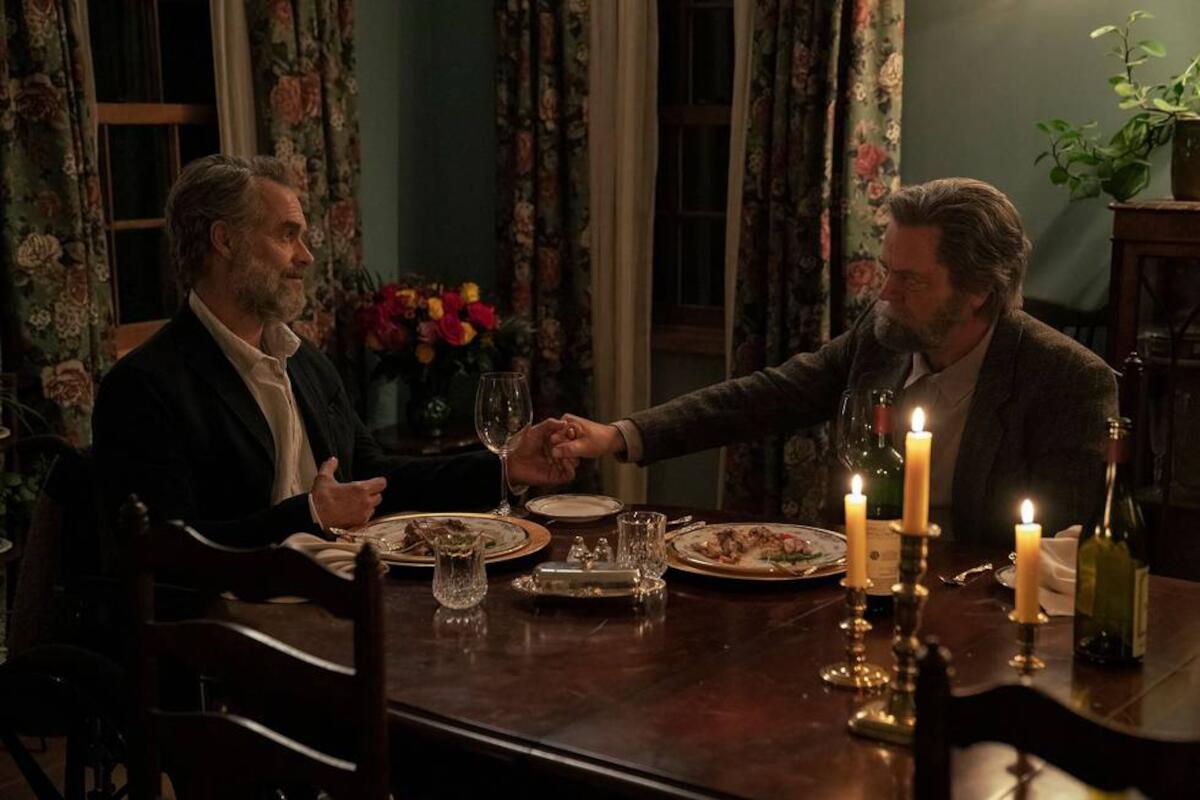
“For people who played the game and loved the game, this is pretty much all entirely new,” said Mazin. “The story of Bill and Frank and the letter that Bill leaves behind [in the show] is such a huge part of why Joel decides he’s going to keep going [on this journey] with Ellie … Their relationship ultimately becomes kind of the skeleton key to unlock all of this show, as far as I’m concerned.”
Bill and Frank’s story is far more tragic in the game. Much like in the show, Joel and Ellie seek out Bill because they need a vehicle for their cross-country journey. They encounter Bill alive, and the player must work together with him to make it across town to get necessary equipment. Along the way, Bill mentions a former “partner” named Frank before the group discovers a body and learns that Frank has hanged himself after being bitten by the infected. Some optional digging around can lead to the player finding a letter Frank has left for Bill, telling him, “I hated your guts.”
Neil Druckmann, the series co-creator and executive producer who also wrote the original game, credits the initial idea of Bill to “The Last of Us” game director Bruce Straley. The idea behind Bill, Druckmann said, was to introduce “someone that lives on their own” who is “kind of kooky, because what are you surviving for at that point?”
‘The Last of Us,’ HBO’s new prestige drama based on the video game, stands apart from other zombie fare despite a shared post-apocalyptic premise.
According to Druckmann, Bill’s backstory involving a previous partner was something thatwas developed up over the course of the game’s production. Although he had written Bill and Frank’s relationship to be romantic — because that would be a greater loss — Druckmann left it up to Bill’s actor, W. Earl Brown, to interpret whether the character was gay. And he did. (As Druckmann himself says in the game’s commentary, Bill’s sexuality and the nature of Bill and Frank’s “partnership” are never explicitly mentioned in the game. But it can be inferred by a magazine Ellie finds and shows Joel.)
According to Straley, the reason for Bill’s existence in the game is that he’s “a person who had genuine feelings for another human being in that world, and is having a reaction to that [relationship ending]. That reaction is being projected onto Joel and Ellie’s relationship.”
While Bill vocalizes one warning — that getting close to someone is how you get killed in the world of the game — his purpose is to serve as the opposite. Bill is a glimpse of the kind of person Joel could become if he continues to avoid getting close to others: eccentric, bitter and alone.
Mazin saw the TV adaptation as a chance for Bill and Frank to live a different story. Whereas the game is limited, for the most part, to telling its narrative through the perspective of Joel in order to give players an immersive experience, television has more freedom.

For Mazin, Bill and Frank were an opportunity to show Joel and the audience that “there is a way for people to achieve a kind of peace and happiness and love in this world.”
Besides being a way for the series to show time elapsing from the beginning of the pandemic to the show’s present for the first time, Bill and Frank provided the opportunity to portray “two human beings who have been in a committed relationship for a really long time,” said Mazin.
It was an important opportunity to show a pair of lives well-lived. Because for all of the dangers that exist in the world of the show, Bill and Frank found each other and lived a life together. The care that Mazin and the show’s creatives took in telling their story and depicting their relationship is clear.
After an Emmy win for ‘White Lotus’ and a key role in ‘Welcome to Chippendales,’ the actor’s career is full of choices. It wasn’t always that way.
“I think in a show like this, where the world around our characters is constantly pressuring them … there is the tendency for endings to be tragic and violent and abrupt and too soon,” said Mazin. “And I thought it was important to show how a relationship could endure, and then conclude in a natural way. Because death is a perfectly natural thing to do.”
“The whole thing is about hope and humanity being able to construct hope and believe hope,” said Peter Hoar, the episode’s director. “The reason we believe in anything is because we think it’s going to help us. Faith, or otherwise, it’s something that you construct around you to go, ‘Yeah, see, it’s worth it.’ For that to be a gay love story, an LGBTQ love story, was just the icing on the cake.”
While there have been rumblings that Episode 3 could be divisive among existing “Last of Us” fans, Hoar believes they deserve more credit.
“They know why they like ‘The Last of Us,’” said Hoar. “Yes, the game play was good, but they liked ‘The Last of Us’ because of how it made them feel. I think that’s what we do in Episode 3. We make you feel it.”

Ultimately, the tragedy of Episode 3 is not how Bill and Frank have chosen to die together, but the message that Bill has left for Joel in a letter. Because Bill saw a kindred spirit in Joel as someone who protects those they love, he bequeaths everything he owns to Joel so he can keep Tess safe.
“Bill doesn’t know that Joel has failed,” said Mazin. “Not once, mind you, but twice. Joel has failed to keep his daughter alive. He’s failed to keep Tess alive. And now, his only chance to be the person that Bill says he is, is to keep this kid [Ellie] alive.”
Druckmann, for his part, is pleased that the game inspired the emotional story told in Episode 3.
“I feel like this sequence is really beautiful, and it’s really beautiful for the show in a way that we couldn’t do in the game,” said Druckmann. “Even though that episode deviates quite a bit from the game, and the fate of the character is different from the game. It’s so beautiful and so moving that I think it’s worth it.”
Times game critic Todd Martens contributed to this story.
‘The Last of Us’
Where: HBO
When: Sunday, 9 p.m.
Streaming: HBO Max, any time
Rating: TV-MA (may be unsuitable for children under the age of 17)
More to Read
The complete guide to home viewing
Get Screen Gab for everything about the TV shows and streaming movies everyone’s talking about.
You may occasionally receive promotional content from the Los Angeles Times.
